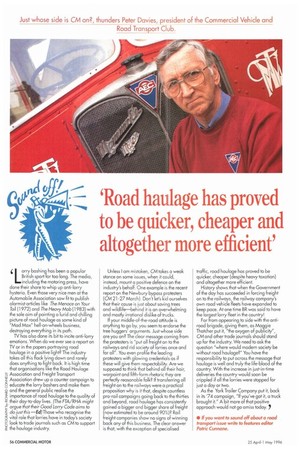'Road haulage has proved to be quicker, cheaper and altogether more efficient'
Page 58

If you've noticed an error in this article please click here to report it so we can fix it.
4 orry bashing has been a popular L
British sport For too long. The media, including the motoring press, have done their share to whip up anti-lorry hysteria. Even those very nice men at the Automobile Association saw fit to publish alarmist articles like The Menace on Your TaJ1 (1972) and The Heavy Mob (1983) with the sole aim of painting a lurid and chilling picture of road haulage as some kind of "Mad Max" hell-on-wheels business, destroying everything in its path. TV has also done its bit to incite anti-lorry emotions. When do we ever see a report on TV or in the papers portraying road haulage in a jpositive light? The industry takes all this Flack lying down and rarely does anything to fight back. It is high time that organisations like the Road Haulage Association and Freight Transport J,
z Association drew up a counter campaign to 6 educate the lorry bashers and make them u
,9 and the general public realise the
1 importance of road haulage to the quality of 'd their day-to-day lives. (The FTA/RHA might ;I! argue that their Good Lorry Code aims to ido just this —Ed) Those who recognise the , vital role that lorries have in today's society V look to trade journals such as CM to support i the haulage industry.
Unless I am mistaken, CM takes a weak stance on some issues, when it could, instead, mount a positive defence on the industry's behalf. One example is the recent report on the Newbury bypass protesters (CM 21-27 March) Don't let's kid ourselves that their cause is just about saving trees and wildlife—behind it is an overwhelming and mostly irrational dislike of trucks.
If your middle-of-the-road attitude is anything to go by, you seem to endorse the tree huggers' arguments. Just whose side are you on? The clear message coming from the protesters is "put all Freight on to the railways and rid society of lorries once and for all". You even profile the leading protesters with glowing credentials as if these will give them respectability. Are we supposed to think that behind all their hair, war paint and fifth-form rhetoric they are perfectly reasonable Folk? If transferring all freight on to the railways were a practical proposition why is it that, despite countless pro-rail campaigns going back to the thirties and beyond, road haulage has consistently gained a bigger and bigger share of freight
now estimated to be around 90%1? Rail eight companies show no signs of winning back any of this business. The clear answer is that, with the exception of specialised traffic, road haulage has proved to be quicker, cheaper (despite heavy taxation) and altogether more efficient. History shows that when the Government of the day has succeeded in forcing freight on to the railways, the railway company's own road vehicle fleets have expanded to keep pace. At one time BR was said to have the largest lorry fleet in the country!
Far From appearing to side with the antiroad brigade, giving them, as Maggie Thatcher put it, "the oxygen of publicity", CM and other trade journals should stand up for the industry. We need to ask the question "where would modem society be without road haulage?" You have the responsibility to put across the message that haulage is well and truly the life-blood of the country. With the increase in just-in-time deliveries the country would soon be crippled if all the lorries were stopped for just a day or two.
As the York Trailer Company put it, back in its '74 campaign, "If you've got it, a truck brought it." A bit more of that positive approach would not go amiss today.
• If you want to sound off about a road transport issue write to features editor Patric Cunnane.
























































































































